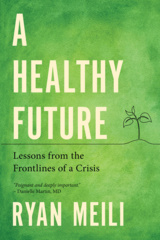
Health Advocacy, Inc.
How Pharmaceutical Funding Changed the Breast Cancer Movement
Today, most patient groups in Canada are funded by the pharmaceutical industry, raising an important ethical question: do alliances between patient organizations and corporate sponsors ultimately lead to policies that are counter to the public interest? In this examination of Canada’s breast cancer movement from 1990 to 2010, health activist, scholar, and cancer survivor Sharon Batt investigates the relationship between patient advocacy groups and the pharmaceutical industry – and the hidden implications of pharma funding for health policy.
Health Advocacy, Inc. dissects the alliances between the companies that sell pharmaceuticals and the individuals who use them, drawing links between neoliberalism and corporate financing and the ensuing threat to the public health care system. Batt combines archival analysis, interviews with advocacy and industry representatives, and personal observation to reveal how a reduction in state funding drove patient groups to form partnerships with the private sector. The resulting power imbalance continues to challenge the groups’ ability to put patients’ interests ahead of those of the industry.
Batt’s conclusion is unsettling: a once-vibrant movement that encouraged democratic participation in the development of health policy now eerily echoes the demands of the pharmaceutical industry. This thorough account of the shift from grassroots advocacy to Big Pharma partnership defines the struggles and stakes of activism in public health today.
The book will be of value to scholars and students of medicine and health policy, public health, the sociology of health, women’s studies, science and technology studies, and political economy. It will also interest those involved in patient and health consumer advocacy groups, pharmaceutical policy, the breast cancer movement, and neoliberal governance.
[Health Advocacy Inc.] expands the conversation into new terrain, exploring how industry infiltrates patient advocacy groups employing the same tools that have been so successful with doctors…
Batt`s scholarly approach allows opposing voices ... [her] goal is to start a conversation and encourage discussion. She readily achieves this effect, and any cancer charity currently facing a funding dilemma would be well served by her book.
Health Advocacy Inc. occasionally feels like a Russian novel. It has plot twists and dissidents whose tactics and rebellions against drug companies are nothing short of heroic. Yet Batt eschews sensational tropes about the evils of big pharma in favour of interviews and archives describing the gradual demise of the breast cancer movement.
Batt makes a powerful case ... To this reviewer’s knowledge, this is the only study tracking the process of neoliberal reform and its cumulative impact on the same groups within civil society over such a long time frame and is ground breaking for that reason alone.
[Batt’s] superb new book is a deep scholarly account of the way that pharmaceutical funding has warped the patient advocacy movement into a tool for medical capitalism ... Few writers are better placed to document this story ... Would-be rebels and reformers should take to heart the cautionary lessons of Health Advocacy, Inc.
Batt’s revelations about the relationship between patient advocacy groups and the pharmaceutical industry are vital and disturbing.
In sum, Batt’s is a terrific book, a focused study of a policy area that has many lessons for all concerned with effective democratic policy making and the consequences of public-private partnerships and donor influence.
Health Advocacy Inc. is an extremely stimulating and timely book benefitting from the author’s scholarly skills, but also from her particular standpoint as a breast cancer activist.
Batt has written a compassionate account of the debates among breast cancer activists in Canada and internationally about whether to accept money from the pharmaceutical industry … Now more than ever we need advocates who put drug safety, effectiveness and affordability above the interests of pharma.
[Health Advocacy, Inc.] is not an easy read, but it should be devoured by anyone, from any nation, who wants to put together a similarly formidable argument for transparent and genuine discussion about what we should – indeed, must – do differently to prevent and treat human suffering and disease.
What makes the book stand out from the rest of the vast literature on these dynamics is the wealth of personal vignettes and in-depth case studies…Academics, funders, policy researchers and campaigners of all political stripes will find a lot to like, learn and think about in this meticulously researched and well-written book.
To Batt’s credit, she never falls into the partisan trap of framing the issue as a moralistic struggle of good versus evil. While she stakes out a strong position, she treats the topic with the nuance it deserves. Drawing on a wealth of ethnographic material, she chronicles how decent people and committed organisations struggled to support and represent breast cancer patients over many years, despite financial constraints and funder attempts at co-optation.
Sharon Batt was a pioneer of the breast-cancer patients’ movement. No one is better positioned to tell the ultimate insider story of how the movement grew, feuded, and was slowly sundered by Big Pharma’s clever seductions. It’s a blistering but balanced study of the impossible strains imposed on our medical system and those who struggle within it – a cautionary but constructive tale for our times.
Sharon Batt, herself a breast cancer survivor, weaves the personal with the political to tell the story of how most of the breast cancer movement ended up in the arms of the pharmaceutical industry. Abandoned by the federal government as it increasingly adopted a set of neoliberal values, the patient breast cancer groups turned to the drug companies for funding, and in doing so lost their way.
Sharon Batt’s thorough and detailed book revisits some key history around breast cancer activism, pointing out, for example, the serious conflict of interest that shaped the work of the prominent women’s health movement advocate Rose Kushner. Batt both ‘follows the money’ and also offers a sympathetic analysis of the challenges facing public interest groups seeking to educate the public in the face of well-financed opposition. A must for any social justice activist wishing to learn from the past, as well as why there is no such thing as a free lunch and how hard it can be to avoid biting the hand of those that feed us. I was particularly pleased to see the chronicling of how several long-time principled activists within the Canadian women’s health movement laid the foundation for important crossborder collaboration with US feminist activists that extends even to this day.
Sharon Batt catalogues with exquisite and agonizing precision the predatory funding by drug companies of breast-cancer–patient advocacy groups and the consequent loss of authenticity and trustworthiness of breast cancer advocates. It is an alarming historical record and inseparable from government cuts to patient groups and the infiltration of corporate values into patient care and activism.
I recommend this book to anyone who wants to understand the government policy changes and the manipulations, conflicts of interest, and very human dynamics that undermined the integrity of the breast cancer patient/survivor movement and skewed patient advocacy towards pharmaceutical industry interests. Sharon Batt’s meticulous research lays bare the troubling dynamics of drug industry funding and explores better ways to protect women’s health.
Sharon Batt has given us a riveting account of how health advocacy in Canada became colonized by the pharmaceutical industry. As a leader in the breast cancer and women’s health movement, she provides a compassionate and scholarly overview of the moral and ethical dilemmas many health activists faced when Big Pharma came knocking at the door. Health Advocacy, Inc. describes the public policies that were behind these heart-wrenching debates on the front lines and provides a roadmap back to independence.
This is a powerful insider account, coupled with excellent scholarship, of Big Pharma’s doings in relation to the breast cancer movement. After reading this book, the only thing I wanted was more – more information on how this work applies to other countries and to other health advocacy movements. This is a vitally important book.
A searing indictment of industry subversion of ‘patient’ groups. Batt chronicles the rise of industry fronts and industry-influenced patient groups that arose in parallel with (and as a result of) the rise of neoliberalism. She demonstrates how the same tools used by industry to influence doctors are used to influence key patient groups in ways that patients may not recognize. Required reading for all lay groups tempted by industry money.
This riveting history of the breast cancer movement chronicles, analyzes, and evaluates the relationship between patient advocacy organizations and the pharmaceutical industry. The author’s auto-ethnographic observations shine brilliantly, and the issues she raises should incite debate about the need for medical reform and new health policy.
As a public intellectual whose work spans the worlds of journalism, the women’s movement, breast cancer advocacy, and the social studies of medicine, Sharon Batt provides a nuanced analysis of the vexing problem of political advocacy and industry funding. This book has important implications not only for health policy and patient advocacy but also for the broader political conversation about neoliberalism, democracy, social movements, and social fairness.
Sharon Batt is an independent scholar and adjunct professor in the Department of Bioethics at Dalhousie University and a research affiliate of the university’s Technoscience and Regulation Research Unit. A survivor of breast cancer, she cofounded Breast Cancer Action Québec in 1991.
Batt was a founding editor of Canada’s first feminist magazine, the Edmonton-based Branching Out, and for six years was an editor for the Quebec consumer magazine Protect Yourself. Her documentary on cancer for CBC Radio’s Ideas won the Major Armstrong award; her book, Patient No More: The Politics of Breast Cancer, won the Laura Jamieson Award for feminist nonfiction.
Preface
Introduction: The Secret War among Patient Groups
Part 1: Canada’s Health Care System Transformed – Neoliberalism and the Erosion of the Welfare State
1 Canada’s Health Policy Landscape
2 Health Advocacy Organizations in Canada
Part 2: From Grassroots to Contestation to Partnership – The Breast Cancer Movement and Big Pharma
3 Beginnings of the Breast Cancer Movement
4 Advocacy Redefined
5 The Movement Fractures over Pharma Funding
6 Pharma Funding as the New Norm
7 Advocacy Groups and the Continuing Struggle over the Pharma-Funding Question
Conclusion: The Fight for Medicine’s Soul
Appendix: Organizations and Their Members
Notes
Index














